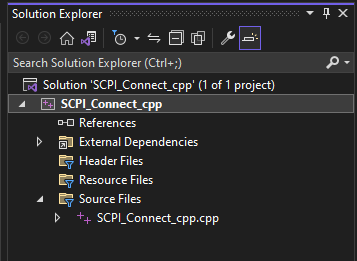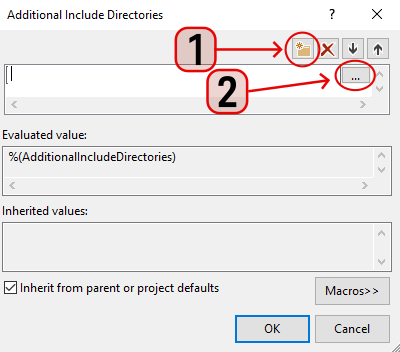
Many practical applications of VNAs require automation and remote control of the instrument. C++ is heavily used in industry for lower-level control, with increased capability for speed, flexibility, and portability. Although the SCPI-based automation implementation in this language is a little more advanced than with other languages like Python or C#, there are many appropriate use cases for it given C++'s widespread use.
This example was created in Microsoft Visual Studio 2022.
Before the example code will run, the folder containing the library GlobMgr.dll must be added as an "include directory". To do this, right-click on the project (not the source file) in the Solution Explorer and choose Properties:

In the Property Pages, find the C/C++ configuration group and locate "Additional Include Directories":

Clicking the dropdown arrow on the right side and selecting "<Edit...>" will open the editor for this field.

Click the New Line button, then the ellipsis button to browse for a folder:

Browse to C:\Program Files\IVI Foundation\VISA\VisaCom64 and click Select Folder, then OK. The folder will be added to the list. Click OK on the Property Pages window.
Note: If these steps are not followed properly, you will see a red underline on the #import line and Visual Studio will not be able to find the dll.
The IVI Foundation folder and containing files are installed alongside Keysight IO Libraries.
#include <iostream>
#include <stdio.h>
#import "C:\Program Files\IVI Foundation\VISA\VisaCom64\GlobMgr.dll" no_namespace
using namespace std;
int main()
{
IResourceManagerPtr rmPtr;
IMessagePtr msgPtr;
IFormattedIO488Ptr fmioPtr;
HRESULT _ = CoInitialize(NULL);
_bstr_t dev_addr = "TCPIP0::localhost::hislip0::INSTR"; // Edit this to your address
try
{
// Instantiate the Global Resource Manager and Formatted IO class
rmPtr.CreateInstance(__uuidof(ResourceManager));
fmioPtr.CreateInstance(__uuidof(FormattedIO488));
// Open session with the default values for the Lock (None), Timeout(N/A), OptionString ("")
msgPtr = rmPtr->Open(dev_addr, NO_LOCK, 0, "");
_bstr_t idnstr;
long count = 100, written;
msgPtr->Clear();
written = msgPtr->WriteString("*IDN?\n");
idnstr = msgPtr->ReadString(count);
cout << idnstr;
}
catch (_com_error& err)
{
if (msgPtr != NULL)
{
msgPtr->Close();
msgPtr = NULL;
}
rmPtr = NULL;
fmioPtr = NULL;
cout<< err.Description();
return 1;
}
// Session must be closed before calling CoUninitialize() to avoid memory reference issues
msgPtr->Close();
msgPtr = NULL;
rmPtr = NULL;
fmioPtr = NULL;
CoUninitialize();
return 0;
}
This example uses the library GlobMgr.dll to access the methods needed to communicate with the instrument. When adding your own commands to this example, use msgPtr->WriteString() and msgPtr->ReadString() to write commands and read responses to queries, respectively.